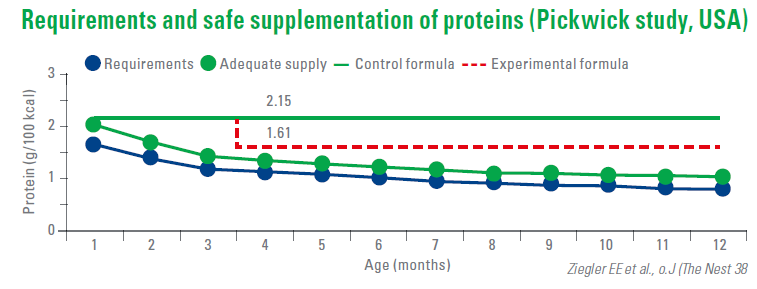Growth and Proteins
Optimised infant nutrition due to reduced protein content
An excessively high protein intake in infancy is related to an increased risk of adiposity in childhood. Infant formula with reduced protein content could be a solution.
Infants, who are fed conventional infant formula, consume more protein than breast-fed infants, since the content is not suited to the age and requirements of the infant. Epidemiological studies have shown that excessively high intakes of protein during childhood are related to an increased risk of obesity in childhood.
In the last few years, new technologies have been developed in the field of protein research, which are enhancing the biological quality of proteins in infant formula. It has therefore become possible to develop infant formula with less but high-quality protein.
In a recently concluded study, an infant formula with low protein content (1.61 g/100 kcal) was compared with a standard infant formula (protein content 2.15 g/100 kcal). Infants with overweight or obese mothers were examined in the study. The nutrition study was started at the age of 3 months, the infant formula was fed until the age of 1 year.
The infants in both infant formula groups showed a growth classified as normal
Infants, who were fed the infant formula with less proteins which were consequently within the WHO standards, showed slower weight gain than the infants from the other group
The growth-slowing effect was particularly pronounced in infants with obese mothers and in infants with an already extremely fast degree of growth
A study with infant formula with less protein (1.6 g/100 kcal) fed to infants with normal-weighing mothers also showed a slightly lower effect on the growth after 3 months.
The infants had similar protein accumulation between the 3rd and the 6th month, irrespective of the protein content.
Biomarkers (insulin and IGF-1) in infants, who were fed formula with low protein content, differ from those who were fed formula with higher protein content. 6 year old infants, who were fed formula with low protein content in the first year of the life, showed a lower risk of infant overweight. At 5 years of age, their BMI is similar to breast-fed infants.

The reduction of protein content in infant formula can significantly contribute to the prevention of obesity. Of key importance here is the fact that infant formula with lower but high-quality protein content promotes normal growth and is appropriate for all healthy term infants.
Infant nutrition: Less protein = less overweight?
Infant nutrition is considered to be the most important factor for the effective prevention of obesity in childhood. It was investigated whether the reduction of protein in the infant formula lowers the BMI and the prevalence of obesity at the age of 6 years.
A high protein intake is related to quicker weight gain in infancy. The Childhood Obesity Project was carried out as a European multi-centric, double blind, randomised clinical trial, which included infants, who were born between October 2002 and July 2004. Infants, who were fed infant formula (n = 1,090) received a high-protein (HP) or low-protein (LP) infant formula within the then recommended quantities in the first year of life. Breast-fed infants (n = 588) were enrolled as a reference group. The weight and height of 448 (41%) infants at the age of 6 years was measured.
HP infants has a significantly higher BMI at the age of 6 years. The risk of becoming obese was 2.43 times higher in the HP group than in the LP group. There was a tendency towards a higher weight in HP infants, but no differences in height between the intervention groups. Other anthropometric measurements were similar in the LP and the breast-fed groups.
Infant formula with a lower protein content reduces the average BMI
and the risk of obesity during the school age. Avoiding infant formula
that leads to an excessive intake of protein could contribute to a reduction
of obesity in childhood.
